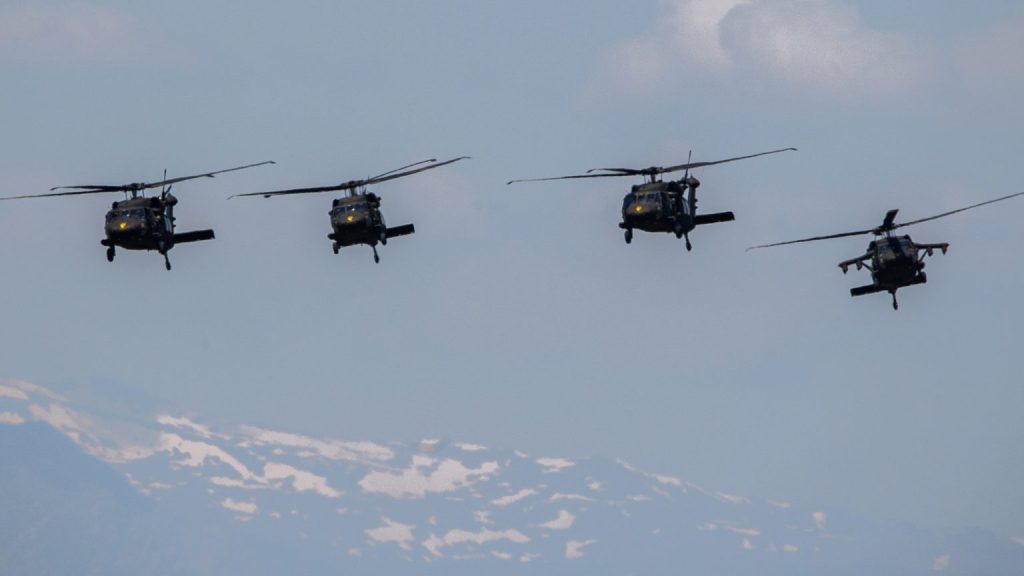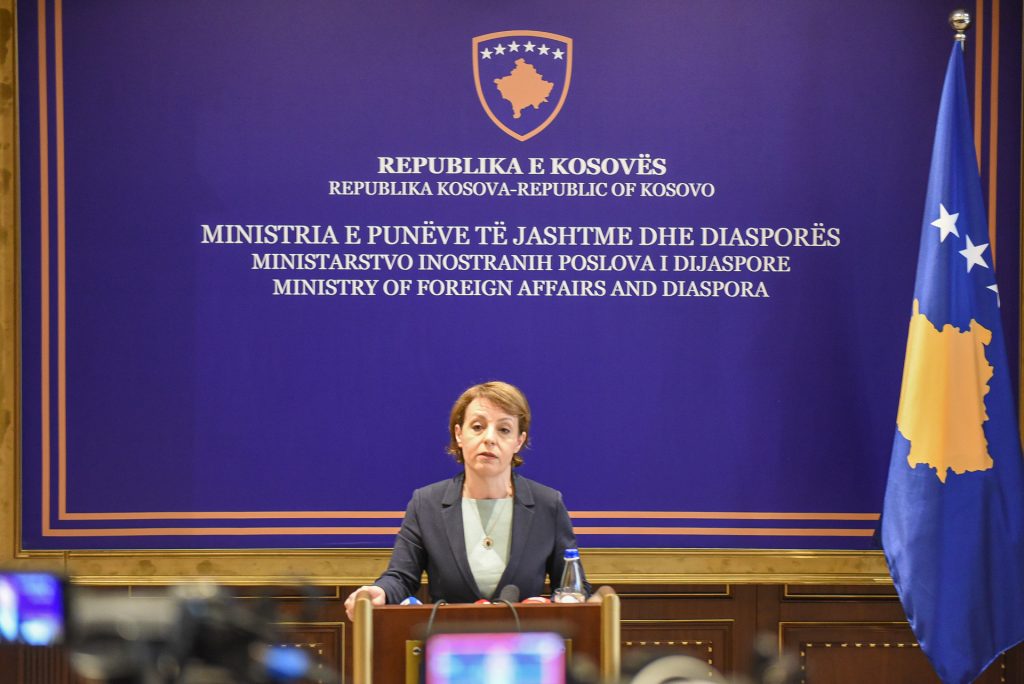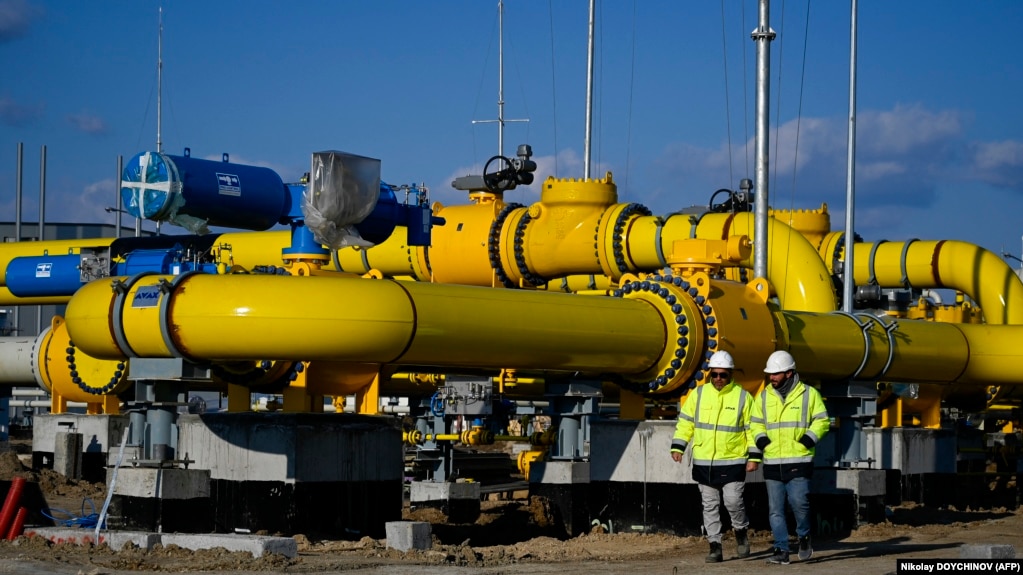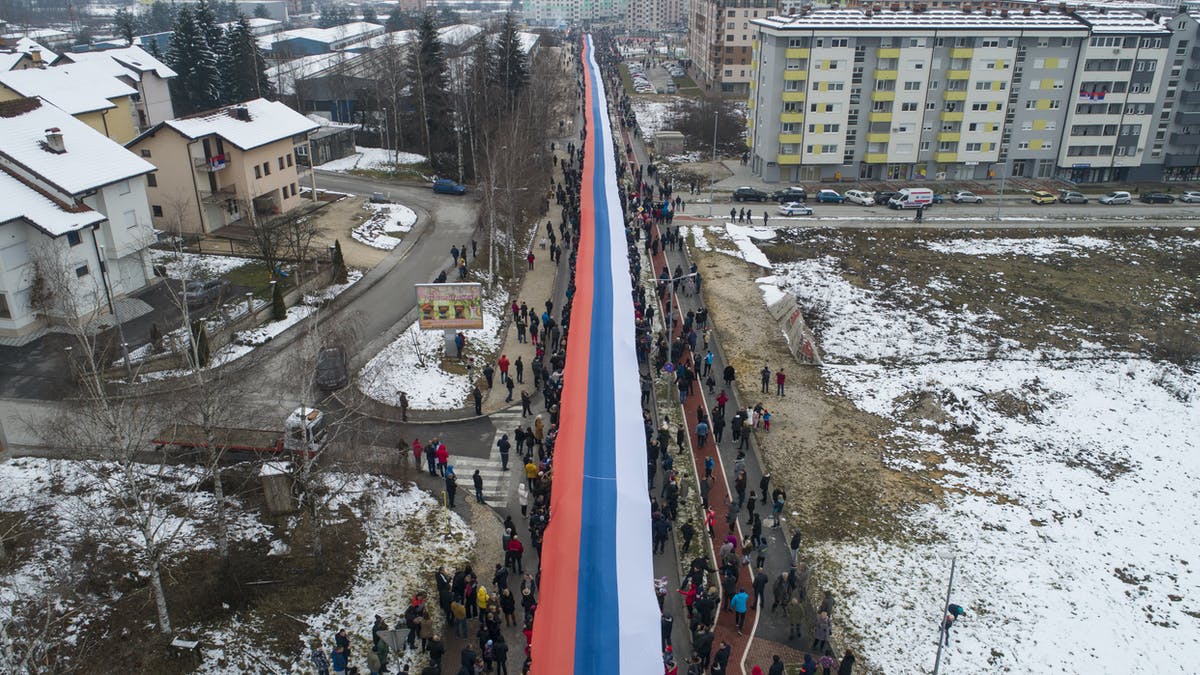Press Reviews
May 2022
International Media Digest
GERMANY LOBBYING FOR EU INTEGRATION OF THE BALKANS, MACRON FOR A ‘TWO-TIER’ EUROPE
Germany is about to start a diplomatic offensive in the European Union, pressing for the EU’s enlargement to the Western Balkans, after years of impasse and amid Russian aggression against Ukraine. However, there is no indication that the campaign will be successful, also due to France’s possible opposition.
The six Western Balkan countries – Albania, Bosnia and Herzegovina, Kosovo, Montenegro, North Macedonia, and Serbia – have been engaged in a years-long reform process to join the EU. Still, the process has largely been stalled due to internal and external factors. The frontrunners in the enlargement process, Montenegro and Serbia, were awarded candidate status in 2009-2010 and began negotiations already in ten years ago. North Macedonia was granted EU candidate status in 2005, but no negotiations were initiated in the past years due to a Bulgarian veto. The same applies to Albania, a candidate since 2014 and the enlargement path of which is ‘coupled’ with Macedonia’s. Bosnia and Herzegovina and Kosovo are still considered as mere prospective candidates.
In May, German Chancellor Olaf Scholz said to the German Parliament that he would be lobbying for the Balkans in the European Union. Scholz announced he would travel to the region prior to a European Council summit next month, where Berlin will send the “clear message” that “the Western Balkans belong in the European Union”. Moreover, Scholz said that there should be no “shortcuts” for a speedy Ukraine’s integration into the EU, as this would be “unfair” for the Western Balkans countries working on membership for more than a decade.
“Honouring our commitments” with the Balkans “is not just a question of our credibility” and “today more than ever, their integration is also in our strategic interests,” Scholz said. The German Chancellor specifically mentioned the need for the EU to consider the Balkans as a strategic area for Europe, where the bloc should counter the influence of “external powers,” particularly Russia, which has a strong presence in Serbia and Republika Srpska, the Bosnian Serb entity of Bosnia and Herzegovina. In April, Scholz also mentioned that a “new era” in the relationship between the EU and the Western Balkans has begun due to the Russian aggression against Ukraine.
It is possible that other member states of the EU, such as Italy, will support Germany’s strategy, even though this may run into criticism from other important parts of the bloc, such as France and possibly The Netherlands. Emmanuel Macron, the current President of France, brought up recently the concept of a “two-tier Europe” at the recent Conference on the Future of Europe, just as he has done in the past. Macron stated that the concept would allow for a more tailor-made integration of the European Union neighbourhood, particularly of the Western Balkans countries, Ukraine and the United Kingdom. Macron suggested that this may take the shape of a “European political community,” which would be a step before full membership, yet would bring these countries closer to the EU than they are today. The exact content of the French idea remains unclear, but there are hints that this would include working more closely together in the areas of energy and security.
Delays in the process of enlargement and the “enlargement fatigue” in both the EU and the Balkans have had severe consequences in recent years. These consequences include an increase in foreign influence coming from countries such as Russia, China, Turkey and Arab countries and a significant increase in Euroscepticism among citizens and political leaders in the region. New enlargement delays could lead to widespread dissatisfaction in the region and a rise in the number of citizens who do not anymore regard European Union as a strategic aim to be pursued by their governments.
WAR IN UKRAINE IS IMPACTING SERBIA, BUT TIES TO MOSCOW REMAIN STRONG
Despite assurances from the country’s political leadership that no sanctions will be imposed on Moscow, there were hints in May of a possible shift in Serbian policy toward its Russian partner, leading to a breakthrough with a significant impact on Europe as a whole. However, at the end of the month, Belgrade announced a new deal with Moscow on gas, signalling that a major change is still not in sight.
Serbia has the strategic goal of joining the European Union, but they have strong ties to Russia because of their shared Slavic and Christian Orthodox heritage. More importantly, Russia supports the Serbian position towards Kosovo, which declared its independence in 2008 but is not recognised by Serbia. Serbia is also fully dependent on Russian gas.
Despite increasing pressures from the EU and the US, Serbia has declined to join Western sanctions imposed on Moscow. However, in May there were indications that Serbia is attempting to distance itself from Russia, albeit cautiously. Belgrade has voted in favour of three UN resolutions condemning Russia’s aggression against Kyiv and defending the territorial integrity of Ukraine, and in favour of suspending Russia from the UN Human Rights Council for “gross and systematic violations and abuses of human rights” in Ukraine. Furthermore, Serbia signed the so-called ‘Tirana Declaration’ in May. “We regret in the strongest terms Russia’s illegal and unjustified aggression against Ukraine (…) and we confirm our commitment to the sovereignty, independence, unity and territorial integrity of Ukraine within its internationally recognised borders,” states of the Adriatic-Ionian region, including Serbia, said in the Declaration.
An interesting signal also came from Serbian pro-government, pro-Russian tabloids and the country’s most widely read print media. The Serbian tabloids, the ‘voice’ of the government in Belgrade, were at the beginning very supportive of Putin and of the Russian aggression. Subsequently, they started to have a more neutral approach towards the war and, finally, they even started publishing highly critical headlines against Putin. “We pay the price for the global conflict: Putin plays the Kosovo card” (Informer), “Celebration in Pristina, Zagreb and Sarajevo after Putin’s statement” (Alo), “The bare interest: Putin protects the interests of Russia… without taking into account Serbia’s position over Kosovo” (Kurir).
The headlines referred to controversial statements made by Putin during a meeting with the UN Secretary-General Antonio Guterres, widely seen in Serbia as a radical change of the Russian policy towards Kosovo. Putin said Kosovo could be seen as a precedent that could be used to justify the Russian recognition of the pro-Russian republics in the Donbas. “Very many states of the West recognised (Kosovo) as an independent state, we did the same in respect of the republics” of Donbas, Putin said.
Even Serbian President Vucic admitted that Putin’s statements are a breakthrough in relations with Moscow. “Our situation has changed for the worse after the statements of Russian President Vladimir Putin. Not because he intended to harm Serbia, but because he raised the issue of Kosovo differently, to protect Russian interests,” Vucic said.
Many observers interpreted all of this as an indicator of a prospective shift in Serbia’s foreign policy, which has recently also indicated an interest in obtaining gas supplies from Greece via a new LNG plant and in purchasing Western fighter jets. Meanwhile, Belgrade has strengthened its already strong ties with China by purchasing Beijing’s advanced air defence system. A further shift of Belgrade away from Moscow may leave Russia without its closest ally in the Balkans and Europe, which will significantly blow for the already limited influence of Putin in the region.
However, following a phone discussion with Vladimir Putin on May 29, Serbian President Vucic stated that he had obtained a new “very favourable” three-year natural gas deal with Russia. The new pact may indicate that Belgrade will be unable to shift its attitude toward Russia in the near future.
Further News and Views

NATO training in North Macedonia and supporting Bosnia
NATO forces conducted military exercises in North Macedonia to prepare for a possible spill over of the Ukraine crisis into the Balkans. Ten thousand soldiers from 19 countries participated in NATO’s “Swift Response” exercises in North Macedonia as Russia’s assault on Ukraine continued. The Balkan Security Network claimed this is a test for NATO if it needs to deploy in the Balkans or Eastern Europe. Official US Army Europe and Africa command state that the exercise tests the ability of deploying allied airborne forces with little warning along a front from the Arctic to the Balkans. NATO Secretary-General Jens Stoltenberg emphasised NATO’s strong support for Bosnia and Herzegovina’s sovereignty and territorial integrity, saying the alliance “remains committed to its Euro-Atlantic goals.”
Balkan Insight, NATO, UK Government

Kosovo applies for CoE membership, which angers Serbia
After Russia’s expulsion, Kosovo has requested to join the Council of Europe (CoE), the continent’s most prominent human rights organisation. The long-delayed application for the CoE membership is aimed at boosting Kosovo’s international legal status. Serbian President Vucic has vowed a “strong and serious” response. Meanwhile, Serbian Foreign Minister Nikola Selakovic claimed that four more nations had revoked recognition of Kosovo as an independent state. He said Serbia would resume the international campaign for the ‘derecognition’ of Kosovo after its former province sought Council of Europe membership.
Euractiv, Balkan Insight, Radio Free Europe

Bulgaria will receive US gas, G7 offers help to the Balkans
According to a deal signed between Prime Minister Kiril Petkov and US Vice President Kamala Harris, Bulgaria will obtain US LNG at lower prices than Gazprom after Russia cut the gas deliveries to Sofia. The plan is related to the project of the Alexandroupolis LNG terminal, an essential project for the Southeast Europe and the Balkans. The Alexandroupolis terminal will provide 5,5 Bcm of natural gas annually to Greece, Bulgaria, but also to Serbia, and North Macedonia. The new infrastructure is related to other interconnection projects, such as the Gas Interconnector Greece-Bulgaria (IGB), active from September 2022. By diversifying their routes and supply sources, these countries try to reduce their reliance on Russian natural gas.
Euractiv, Balkan Green Energy News
Monthly Analysis
CRISIS DEEPENING IN BOSNIA,
DODIK THREATENS A “PEACEFUL” BREAKUP

In May, the long-running political crisis in Bosnia and Herzegovina, viewed as the most severe Bosnia and Hercegovina has faced since the 1990s, erupted once more, owing to provocations from the Bosnian Serb leadership as well as tensions and issues surrounding the forthcoming general elections. There are signs that the political stability of the country may further deteriorate. There are two main fronts open at this stage.
A leading source of concern remains the role of the Bosnian Serb member of the tripartite presidency, Milorad Dodik, who has been pushing a pseudo-secessionist policy for years. With the tacit support of Moscow, Dodik has threatened since last year to withdraw Bosnian Serbs from multi-ethnic central institutions, including the military forces. In May, Dodik accused the Bosniak political leadership of “Muslim nationalism” and of dominating both Serbs and Croats in Bosnia. Furthermore, he evoked the idea of the breakup of the Balkan country again. “The time has come to try once again to activate the mechanism of peaceful dissolution”, Dodik said.
In addition, the Bosnian Serb leader reaffirmed his allegiance to Moscow, which has long been a tacit supporter of his political program. He did so after the Russian embassy in Sarajevo, for the second time in two months, threatened Bosnia with consequences if the country joined NATO, a perspective vehemently opposed by Bosnian Serbs. “We won’t join NATO; that subject doesn’t exist,” Dodik said, adding that Moscow has the right to ‘warn’ Bosnia not to enter the alliance.
The second reason of concern is related to the upcoming general elections. The Central Election Commission (CEC) of Bosnia and Herzegovina has set October 2 as the date for general elections, despite the unsuccessful attempts at electoral reform. Croat nationalist parties in BiH have been lobbying for changes to the electoral legislation to increase their representation, even threatening to launch a process to form their own entity. Currently, Bosnia is divided into two semi-autonomous regions. One is controlled by Bosnian Serbs and the other by Bosniaks and Croats together. Joint central institutions bind the two, and all parties must back all significant decisions.
Bosnian Croats are increasingly claiming that they are discriminated against in the current system in the entity shared with Bosniaks. Croat leaders and neighbouring Croatia have asked that the voting system be altered so that only Bosnian Croats can directly elect their Croat members. Bosnian Croat lawmaker Dragan Covic cautioned in a letter that holding elections in such an environment poses a “danger to peace.”
The situation became tenser at the end of May, when Bosniak and Serb ministers in the Council of Ministers, the central government of this Balkan country, voted in favour of allocating funds for the October general elections. However, the measure was not adopted because all of the Croatian ministers were against it, in what was widely perceived as an attempt to undermine the organisation of the elections. This step could lead to further destabilisation of the country.
Blocking of election funding by “HDZ BiH,” the main Bosnian Croat party, strongly backed by Zagreb, which is lately increasingly active politically in Bosnia and Herzegovina, “disregards both democracy and their own expressed principles” and should urgently end, the US Embassy said on Twitter. “The citizens of Bosnia and Herzegovina must be enabled to enjoy their democratic right to free, fair and democratic elections,” the Office of the High Representative in Bosnia and Herzegovina said. The EU’s Delegation in Sarajevo also marked the failure to ensure the financing of elections as “deeply disappointing”, the regional television N1 reported.
In general, it appears that Bosnia and Herzegovina is going to face more tensions in the months to come, as the country is torn apart by the pseudo-secessionist tendencies of the Bosnian Serbs and the desire for greater autonomy of the Bosnian Croats. In addition to this, there is an expanding Russian influence channelled through Bosnian Serbs representatives, an additional factor to take into consideration.
The Insight Angle

ADI CERIMAGIC
Senior Analyst
European Stability Initiative (ESI), Berlin
Certain EU countries – above all Germany – seem now interested in reviving the EU enlargement process in the Balkans. Do you think this is a realistic scenario?
The best-case scenario for the EU and six Western Balkans states would be for EU member states to agree on offering all six a realistic chance of becoming full members of the EU by the end of this decade. Many EU member states which are friends of the region are already arguing for such scenario. If all EU member states would be serious about such offer, then what happens next would depend on governments in the region doing the reforms. Those that would succeed could then serve as example for others.
We have seen such positive dynamic in previous enlargements but also in the region whenever there was an offer from EU that authorities and public believed was achievable, from visa free travel to start of accession talks. But at the moment, the EU member states are too divided on this and I do not think there is enough energy to agree on making this kind of an offer to the Western Balkans. Too many in the EU, including many liberal and pro-EU politicians in Paris, Berlin and elsewhere, see enlargement of the EU as a process that makes EU weaker.
So, my biggest fear is that the outcome of these discussions on EU policy towards the region will be continuation of the status quo which is characterised by empty phrases of “EU membership perspective” and broken accession process that has no meaningful, realistic or achievable goal. This would leave region with even bigger frustrations and EU without much impact in the region.
The Russian aggression against Ukraine is having a profound impact in the Balkans. Are you concerned about a further destabilisation of the region?
My biggest concern is wishful thinking among EU politicians who are convinced that in the Western Balkans things will in the end work out somehow. This kind of thinking was behind EU’s hesitance since 2014 to make concrete and bold decisions on Ukraine. We have seen where that led and for me there is no reason not to think Western Balkans could end in the similar situation as Ukraine today.
Even before invasion on Ukraine, we had political leaders in Serbia, Bosnia-Herzegovina and Kosovo talking about outbreak of violence and wars in the region. They spoke about who has what kind of weapons and how quickly they can have 200.000 or more soldiers trained and fighting. Such narratives, in combination with inflation and economic difficulties related to the pandemic and the Ukraine war, form a poisonous mix that we have seen becoming deadly in the region thirty years ago.
This is why we need EU leaders who are rightly concerned about the future of the region to come up with bold and realistic ideas and proposals. Such that are able to convince and bring together all 27 member states.
There are some indications that Serbia could change its policy towards Russia. Do you think this is a realistic scenario?
Yes, there are some signs that Serbian authorities and citizens are ready to stand with Ukraine. But at the same time there are signs that this will not happen. EU, NATO and the Western Balkans need Serbia as their full-fledged partner. For that to happen EU needs to tell Serbia that if it aligns with the EU and does all the reforms, in five years it could become part of peace, stability and prosperity of the EU.
One way of doing that was proposed by President Aleksandar Vucic in mid-May 2022. When EU President Charles Michel visited Belgrade, President Vucic told him very directly that for Serbia it is extremely important to be part of EU four freedoms of movement: goods, services, capital and persons. EU should respond to this call by Vucic positively. It should offer Serbia and all other Western Balkans countries a path to becoming part of the EU single market in five years. This could help anchor Serbia to the West.
How about the dialogue between Serbia and Kosovo?
Whenever authorities in Serbia believed they could move closer to the EU, they were ready to make painful compromises on Kosovo. To open accession talks, for example, Serbia accepted to integrate Serb areas of Kosovo in judicial, police and customs systems of the Republic of Kosovo. Today when EU accession process is broken, EU struggles even to strike a deal on politically symbolic but practically very important issues such as car plates. So, as far as EU offer to Serbia and the region is broken, I do not see any reason for big breakthroughs.
Kosovo was right to apply for the Council of Europe membership. Those member states that recognise Kosovo would be right to champion its path to membership. Why? Kosovo’s membership is in the interest of the Council of Europe and its member states. But, also, in the interest of all citizens of Kosovo, including its Serb minority, who would get access to the European Court of Human Rights and other mechanisms for protections of human rights.
Bosnia and Herzegovina is heading towards elections after the secessionist threats of Dodik and without an electoral reform. Are you concerned that the country is entering a new dangerous phase in its history?
I am very concerned about Bosnia and Herzegovina. Since last summer the ruling coalition in Republika Srpska entity has agreed upon and started to implement a plan that aims to collapse institutional and constitutional architecture of the country. One that has been built with the Dayton Peace Accords, post-conflict rebuilding and reintegration of the country and path towards EU membership.
This plan and activities are even more dangerous since in parallel we see activities aimed at rewriting the history of the 1990s war. Also, increasing number of politicians in the country speak about military power of their own ethnic group and how fast they could train people ready for combat. This brings fear to all those in BiH who live in municipalities where their own ethnic group is not in majority, which is 1 in 4 persons.
So far EU and its Western partners – the UK and the USA – were able to avoid total meltdown or conflict. While this is encouraging, it is important to note that this can change anytime. This is why EU needs to agree on an offer to all six Western Balkans countries that would stop and reverse this dynamic. Only then EU can hope not only to make conflicts unthinkable in the region but also to motivate substantial and much needed reforms.

Stefano Giantin
Journalist based in the Balkans since 2005, he covers Central- and Eastern Europe for a wide range of media outlets, including the Italian national news agency ANSA, and the dailies La Stampa and Il Piccolo.

